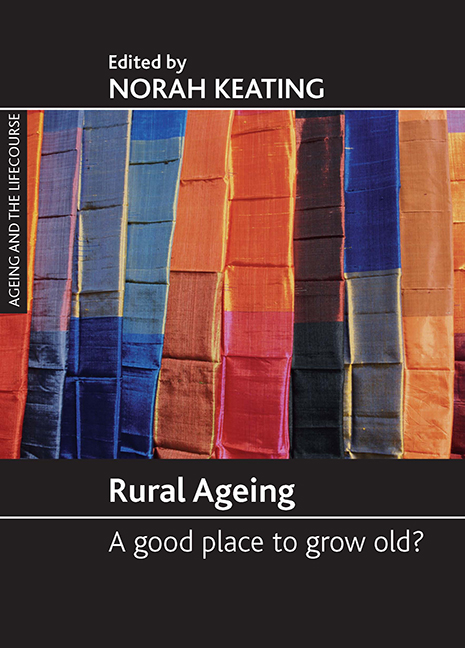Book contents
- Frontmatter
- Contents
- Foreword
- Acknowledgements
- Notes on contributors
- one A critical human ecology perspective on rural ageing
- two Crossing borders: lifecourse, rural ageing and disability
- three Rurality and ageing well: ‘a long time here’
- four The evolution of networks of rural older adults
- five Distance, privacy and independence: rural homecare
- six Respite for rural and remote caregivers
- seven Ageing, disability and participation
- eight Participation in rural contexts: community matters
- nine Staying connected: issues of mobility of older rural adults
- ten Ageing and social exclusion in rural communities
- eleven Age-friendly rural communities
- twelve Revisiting rural ageing
- References
- Index
- Other titles in the Ageing and the Lifecourse series
eight - Participation in rural contexts: community matters
Published online by Cambridge University Press: 19 January 2022
- Frontmatter
- Contents
- Foreword
- Acknowledgements
- Notes on contributors
- one A critical human ecology perspective on rural ageing
- two Crossing borders: lifecourse, rural ageing and disability
- three Rurality and ageing well: ‘a long time here’
- four The evolution of networks of rural older adults
- five Distance, privacy and independence: rural homecare
- six Respite for rural and remote caregivers
- seven Ageing, disability and participation
- eight Participation in rural contexts: community matters
- nine Staying connected: issues of mobility of older rural adults
- ten Ageing and social exclusion in rural communities
- eleven Age-friendly rural communities
- twelve Revisiting rural ageing
- References
- Index
- Other titles in the Ageing and the Lifecourse series
Summary
Introduction
Extensive research has shown that social participation has positive associations with better health and well-being in later life. Individuals benefit when participation is meaningful to them (Chapman, 2005) and when personal relationships are formed or strengthened as a result of their engagement (de Jong Gierveld et al, 2006). Yet the ways in which older adults participate may make a difference in terms of whether participation has such positive outcomes. Participation that is freely chosen and is a good fit with one's identity and sense of self may foster positive outcomes (Chapman, 2005). Participation that is not satisfying or is done under duress may be less likely to contribute to ageing well.
Rural communities may be seen as good places for older adults to participate. It is believed that connections to others are easy to develop in these communities as they are small and often have stable populations where people have grown up and grown old together. There also is evidence that rural communities benefit greatly from the contributions of older adults (Liu and Besser, 2003) and in fact are quite dependent on their participation. For example, in some communities, the decline in primary industries like mining, fishing or forestry, or of family farms has led to out-migration of younger people and loss of service infrastructure (Horton, 2005). In others, a boom in resource-extraction industries or the development of retirement housing options in rural areas can generate in-migration to the degree that short-term infrastructure development may not keep pace with economic and population growth (Heather at al, 2005). In these contexts social participation is often seen as a vehicle for rural communities to reinvigorate a declining economy (Shortall, 2004) or to bridge the lack of infrastructure in the midst of an economic boom (Heather et al, 2005).
Rural communities rely on their citizens to support one another. Social participation now is seen as especially important in supporting the social fabric of the community, and in buttressing its service and public infrastructures (Bull, 1998; Shortall, 2004). Adults in mid to later life are seen as a reserve for this social participation. They are assumed to have more free time as their ties to paid work and childcare responsibilities are declining and thus are available for this community work (Herzog et al, 2002; Liu and Besser, 2003).
- Type
- Chapter
- Information
- Rural AgeingA Good Place to Grow Old?, pp. 75 - 86Publisher: Bristol University PressPrint publication year: 2008



